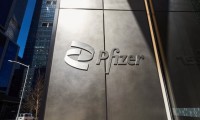-
FDA Rejection Delays Regeneron From Competing With J&J, Pfizer in Multiple Myeloma
- Source: drugdu
- 76
- August 23, 2024
-
Pfizer and BioNTech’s Covid-19/flu combination vaccine falters in Phase III readout
- Source: drugdu
- 69
- August 20, 2024
-
Pfizer’s RSV vaccine shows benefit in immuno-compromised adults in study
- Source: drugdu
- 99
- August 19, 2024
-
Pfizer touts positive topline data for RSV vaccine Abrysvo
- Source: drugdu
- 74
- August 14, 2024
-
FDA Approval of Alopecia Drug Positions Sun Pharma to Compete With Eli Lilly, Pfizer
- Source: drugdu
- 126
- July 30, 2024
-
Pfizer Hemophilia Gene Therapy Meets Phase 3 Goals, But Its Success Matters More to Sangamo
- Source: https://medcitynews.com/author/fvinluan/
- 114
- July 27, 2024
-
Pfizer investigational gene therapy for DMD fails in Phase 3 study
- Source: drugdu
- 123
- June 15, 2024
-
Pfizer’s First Gene Therapy Approval Sets Up a Showdown With CSL in Hemophilia B
- Source: drugdu
- 73
- May 2, 2024
-
FDA Approves Pfizer’s Beqvez for the Treatment of Adults with Moderate to Severe Hemophilia B
- Source: drugdu
- 84
- May 1, 2024
-
Pfizer scores FDA nod for hemophilia B gene therapy, will charge $3.5M per dose
- Source: drugdu
- 86
- April 30, 2024
your submission has already been received.
OK
Subscribe
Please enter a valid Email address!
Submit
The most relevant industry news & insight will be sent to you every two weeks.













